The Stardust inquests, which got under way last April, have moved into a new phase and have begun to hear from members of the emergency services who attended the scene of the deadly fire.
This module marks an end to the evidence given by patrons of the club - those who were there that night and who escaped.
Their stories of survival and loss have been compelling, writes Conor Hunt.
Their physical injuries may have healed, four decades may have passed, but for many who have given evidence to these inquests, the trauma of the Stardust still lingers.
As previously mentioned, while 48 people died in the blaze and the impact of their deaths cannot be diminished, it's clear that the St Valentine's Day disaster of 1981 claimed many more victims who have carried the torment ever since.
The Dublin District Coroner's Court has now heard from well over 100 witnesses who were there that night and who escaped.
We've heard tales of loss, of regret, of grief. We've heard too of survivor’s guilt.
For those who were at the disco that night, who managed to get out, but who had a friend who didn't, their testimony over the last six weeks has at times been particularly upsetting.
'I’m sorry'
In early November, the family of the late Sandra Lawless took their seats in the public gallery.
They had come to the inquests to hear the testimony of Deborah Osbourne, who had been with 18-year-old Sandra in the club that night.
She recalled as the fire, smoke and panic spread, she fell to ground and lay beside Sandra.
"We found each other and were hugging each other," Ms Osborne said.
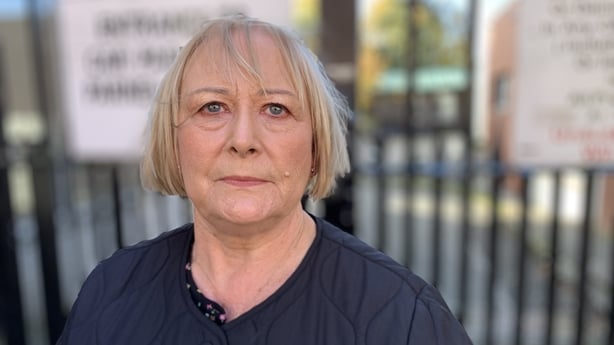
"I had her face in my hands and her face was red and she said 'Deborah we are going to die'.
"And I said, 'no, we're not Sandra' and the two of us lay down."
The court heard how another friend then shook her and told her to get up and how she initially said "no, it's okay" before she did get up on all fours and crawl towards the exit.
"To this day, I don't know why I didn't take Sandra with me," Ms Osborne said.
"I’m sorry," she told the court.
After her testimony Ms Osbourne embraced Sandra's family.
'We promised her mammy that she'd be home'
There was also emotional testimony from Patricia O'Connor.
She was 16 years old in 1981 and the court heard how she helped persuade the mother of Caroline Carey to allow her to go to the Stardust.
Caroline was "grounded" that night, and Patricia, along with another friend, spoke to Caroline's mother, who then let her daughter go.
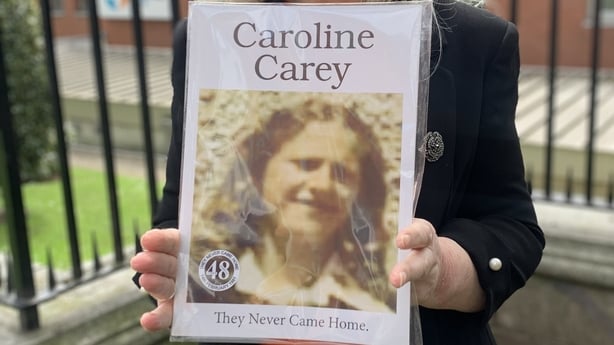
She described how they were "all excited" leaving the house and how Caroline's father had spotted them walking up the road and beeped at them from his car.
She said she could not "go up that road for ten years" after the fire.
In what was upsetting evidence, Ms O'Connor said: "We promised her mammy that she'd be home."
Caroline Carey was 17 years old when she was killed. She was also pregnant.
'We're going to get out of this'
Jimmy Fitzpatrick, who suffered catastrophic injuries in the blaze, also spoke of the friends he had who died.
He had been in the company of a number of people who lost their lives that night, including his Superquinn work colleagues David Morton, 19; Martina Keegan 16; Michael Griffiths, 17; and George O'Connor, 17.
In moving testimony, he also remembered the late Liam Dunne, who had been in a bed beside him in the intensive care unit in hospital.
He recalled how at one point Mr Dunne said to him: "We've made it his far, we’re going to get out of this."
Mr Dunne would later die from his injuries. He was 18.
Young families ripped apart
As well as friends, brothers and sisters killed, the Stardust fire also ripped apart young families and their stories too have been told in recent weeks.
Christina Buckley was at the disco that night along with her husband Jimmy, who was 23 years old.
She said the last time she saw her husband was at their table as he was minding the coats.
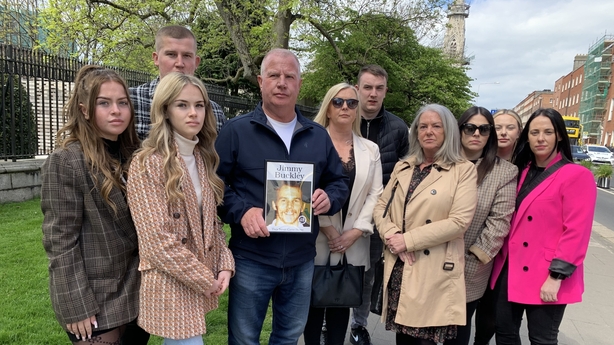
The fire and smoke quickly took hold. She made it out and after some time looked back in an exit.
"It was like looking into a furnace," she said.
"It was just completely red."
The court was also told that 14 February 1981, the date of the fatal disco, was also the first birthday of the Buckleys' daughter.
Marie Hogan was also widowed at the Stardust. Her husband Eugene was killed.
The court heard how the couple and their friends had gone out that night for a farewell as they had been due to move to Kerry the next day, with Eugene to begin work as cabinet maker with Marie's father.
The couple had two young children at the time. The court heard how they had known each other since they were 13.
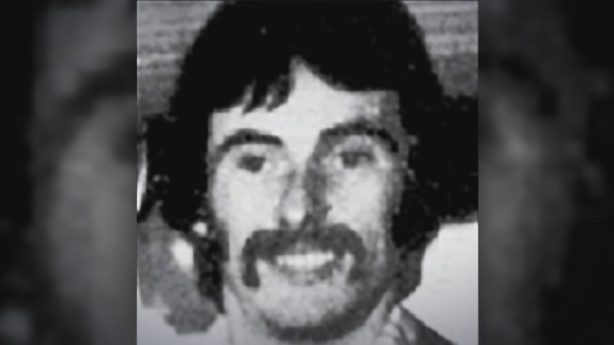
In a statement, she paid tribute to her late husband.
"Me and Eugene, we were only really sort of starting off. Eugene was funny and would make me laugh. He was a hard worker and he was mad about the kids," she said.
"I'll never forget that night," she added.
'I felt so guilty'
Antoinette Keegan lost two sisters, Mary and Martina, in the fire and spoke too of her survivor's guilt.
She described a stampede and the pandemonium as the fire progressed.
Ms Keegan told the court how she and her sisters were holding on to each other's hands as she passed out.
They were around six feet from the exit doors at that stage, she said.
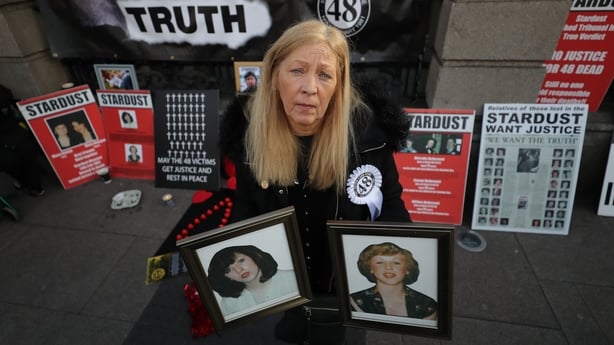
The court heard how Antoinette was dragged out and how her hands had to be kicked to get them released.
She said he felt she had let her father down because she said she would mind her sisters that night.
"I felt so guilty, I got out of the fire and Mary and Martina were killed," she said.
Others too who have given evidence have spoken of the deep impact the disaster had.
Sleeping with the lights on
Despite the passage of time, the night the Stardust burned down has stayed with them.
Joseph Brown said the effects have grown more profound in recent years. Recalling the darkness of the night, he said he sleeps with the lights on.
Nicholas Prior, another survivor, said he had blocked "the whole thing out of my mind".
"That's how I've dealt with it," he said.
Benny Murphy recalled seeing a girl on fire and told the court that every day he wakes up and has memories of her.
"I don't know if she's still alive. Her clothes were burnt off. Her stomach was breathing up and down. It was a horrible, horrible thing," he said.
"I have to face everyday for 42 years … looking back through exit 4 and seeing this girl burning and she was close and you can't get her.
"For the people who survived," he said, "there should be some sort of counselling or something."
'You couldn't see, you couldn’t breathe'
As well as hearing from patrons, the inquests have, in the last six weeks, also heard from local residents who saw flames coming from the roof of the nightclub around the same time as it was first spotted inside the ballroom.
The proceedings have heard numerous times that when the fire was first seen in the club, it was "small".
Where the fire was first spotted and where the fire first started will come under more scrutiny in the coming weeks.
Over the last month-and-a-half, the inquests also heard for the first time, accounts of survivors who were trapped in the toilets.
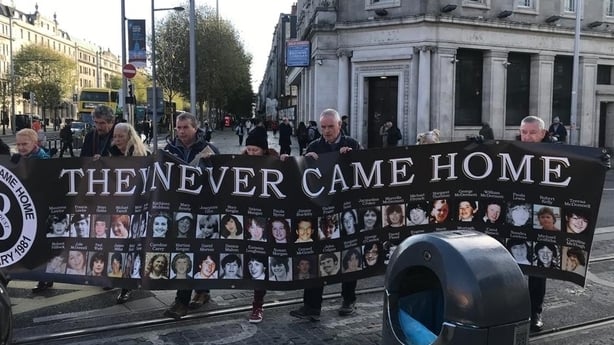
Deirdre Dames was 18 years old at the time.
At one point, she splashed water from the toilets onto her face as the smoke and heat grew more intense.
"You couldn't see, you couldn't breathe," she said.
She said she kept saying to get the windows open and told the inquests she could hear screaming from those on the outside saying "Jesus, get them out".
"But they couldn't do anything for us," she said.
Ms Dames said it felt "like a lifetime" before a fireman opened the door and rescued her. She was given an oxygen mask and he carried her out over his shoulder.
Praying for her life
Louise Murray came to the inquests with a similar story.
She was trapped backstage and said she began praying for her life, thinking she was going to die as the fire progressed.
She said the heat was "like an oven" and told how she lifted the cistern off the toilet and stuck her head down in an effort to get relief.
The court heard how she had given up hope and how she went into a "trance" thinking of her friends and family.
She told the court how she and others began to pray out loud and as soon as they had finished reciting the 'Our Father', the door was "kicked in" by a fireman.
The role of the firemen and the other emergency services will now become the focus of these proceedings.
Those who responded to the fire that night, most retired, will give evidence as these hearings move into a new phase.
The stories from the survivors have now been told at these inquests.
For those listening, they have been compelling.







